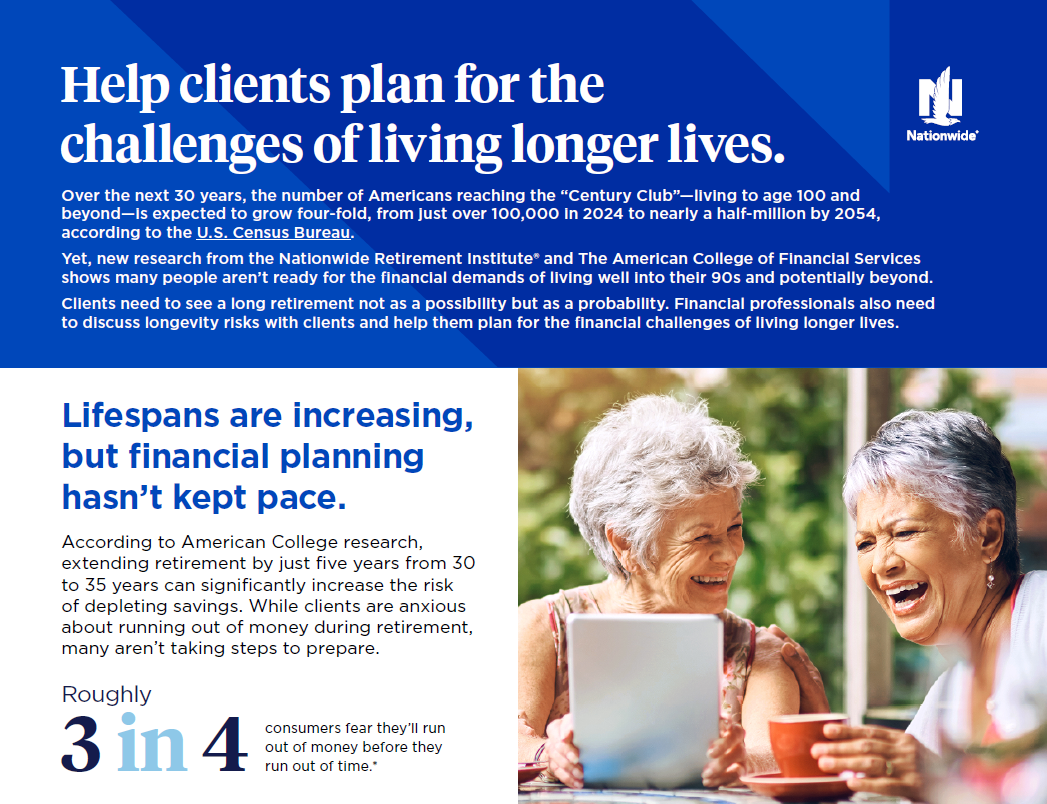Key Takeaways:
- By 2054, Americans reaching age 100+ will quadruple, but financial planning hasn't kept pace—creating an urgent need for financial professionals to help clients prepare for longer lives.
- Most Americans fear outliving their savings but aren't taking action, giving you an opportunity to connect clients with guaranteed income solutions and long-term care coverage.
- Planning scenarios based on realistic life expectancies motivate clients to increase savings, reduce risks, and embrace financial products designed for extended retirements.
05/01/2025 – Americans are living longer than ever, thanks to advances in healthcare, improved access to medical services, and greater awareness of healthy lifestyle choices. Breakthroughs in chronic disease management, preventive care, and medical technology have extended lifespans dramatically over recent decades.
In fact, the number of Americans reaching the "Century Club"—living to age 100 and beyond—is expected to quadruple by 2054, according to the U.S. Census Bureau. For many people, that means retirement may now span 30+ years—nearly a third of their lives. This unprecedented longevity revolution presents both opportunities and challenges, requiring a fundamental shift in how we approach retirement planning and financial security. But new research from the Nationwide Retirement Institute® and The American College of Financial Services (The College) reveals a concerning trend: While lifespans are increasing, financial planning strategies haven't kept pace.
As financial professionals, you play a critical role in helping clients navigate these trends and prepare for what could be decades of life after their working years. Much like how we encourage healthy lifestyle habits to support longer lives, you can help build strong financial habits ensuring clients don't just live longer—they thrive throughout those additional years. Your expertise is increasingly relevant in creating financial plans that account for potentially decades-long retirements.
The longevity planning gap
Research from The College illustrates the stark realities clients face in today's retirement planning challenges. When using historical market returns, extending a retirement horizon from 30 to just 35 years increases the risk of depleting savings by a surprising 41%. When factoring in lower projected recent asset returns, extending retirement by just five years increases the risk of running out of money by more than 300%, according to The College's analysis.
This data highlights why your role has never been more important. According to The College, more than one in four healthy, higher-income men and one in three healthy women will live to age 95. For a healthy couple retiring today, there's a 20% chance one spouse will live beyond age 100. In light of these demographic trends, standard 30-year planning timelines for retirement may no longer be sufficient.
Clients aren't preparing for extended longevity
Despite rising life expectancies, the Nationwide Retirement Institute's® survey reveals most Americans aren't preparing for longer retirements:
- 71% of respondents said they don't want to live to 100, citing health decline and financial concerns
- Roughly three in four fear outliving their savings
- Only 48% consider their potential lifespans when making savings and investment decisions
- 40% of non-retired Americans plan to delay retirement due to inflation, according to The College

View the infographic
These findings demonstrate a significant opportunity for you to educate clients about building resilient portfolios designed to withstand inflation and economic uncertainty and help them generate additional savings to meet guaranteed income needs for potentially decades-long retirements. By helping clients think in terms of inflation protection and living longer in their post-career years, you can help position them to make more informed decisions about savings rates, withdrawal strategies, and risk management—ultimately helping them achieve greater financial security throughout retirement, regardless of how long they live.
Bridge the gap between awareness and action
While Americans express legitimate concerns about outliving their savings, planning solutions that help address common longevity risks remain underutilized. We found that nearly one-third of consumers (32%) believe long-term care insurance would be one of the most helpful resources for preparing to live to 100, yet according to The College, only 14% reported owning a policy.
Similarly, 31% of consumers say solutions that guarantee income for life (such as annuities and lifetime income solutions in retirement plans) would help them feel more financially secure, according to our research. Nonetheless, adoption of these products remains low.
This represents a tremendous opportunity for financial professionals to connect clients with appropriate protected retirement and guaranteed income solutions and long-term care coverage. By introducing these solutions, you can help clients address their most significant longevity concerns—outliving their money and managing potential care needs—providing them with financial and emotional security as they age.
Knowledge motivates behavior changes
Our research shows that when people understand the implications of increased longevity, they're more motivated to change their behavior. If Americans knew they would live longer:
- 67% would pay closer attention to their finances and increase their savings
- 37% would delay retirement
- 33% would take fewer financial risks
Your ability to communicate longevity trends has the potential to directly influence client behavior. By illustrating what extended longevity might mean for their unique situation, you have an opportunity to inspire meaningful changes in their planning approach that help clients maintain dignity, choice, and financial independence throughout their entire lives—no matter how long they live.
Five strategic approaches to help clients plan for longer retirements
By implementing these research-backed strategies, you can help clients prepare for extended longevity while distinguishing your practice in an increasingly competitive marketplace:
1. Initiate longevity literacy conversations:
Individuals who understand their realistic life expectancy are 54% more likely to plan for spending into their 90s, according to The College. Your guidance can help clients avoid the financial and emotional consequences of running out of money in their later years, when they're most vulnerable.
2. Stress test for longer retirements:
Standard 30-year retirement projections are increasingly inadequate. By using realistic assumptions such as modeling for 35+ years, you can help clients visualize and prepare for a potentially much longer retirement, allowing them to make vital adjustments to savings, spending, and investment strategies while they still have time.
3. Emphasize protected income solutions:
Clients with guaranteed income sources report significantly less anxiety about outliving their savings. Highlight annuities and other guaranteed income products as emotional and financial security tools that can provide clients the confidence to enjoy retirement without focusing on market volatility or longevity risk.
4. Address long-term care needs proactively:
LTC policy ownership is strongly associated with higher retirement confidence. Introducing these conversations before the need arises allows clients to secure more affordable coverage and gives them peace of mind that they'll have access to quality care if needed—directly addressing the health decline and financial worries that make many hesitant about living to 100.
5. Tailor approaches by gender and decision-maker roles:
While men and women had similar levels of longevity literacy, women reported lower retirement confidence, The College found. Female clients especially benefit from formal planning and LTC discussions because they typically live longer than men and are more likely to need long-term care, making these solutions especially valuable for their financial security.
Longevity planning support for your clients
By partnering with Nationwide, you gain access to resources that strengthen your value proposition as clients' trusted guide through the complexities of extended longevity.
Together, we can help your clients prepare for a future where living longer isn't just about more years—it's about more quality of life and more financial confidence at every stage of their retirement journey, whether they live to 80, 90, or well beyond.

